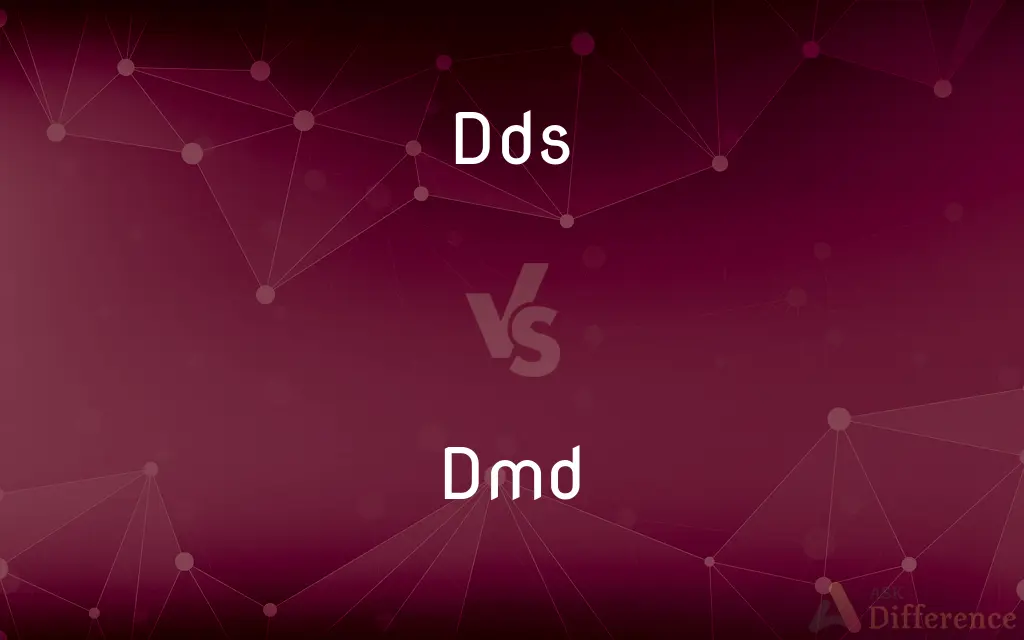DDS vs. DMD — What's the Difference?
By Tayyaba Rehman — Updated on September 23, 2023
DDS stands for "Doctor of Dental Surgery" and DMD stands for "Doctor of Medicine in Dentistry" or "Doctor of Dental Medicine." Both are dental degrees granting the same scope of practice but may differ in name due to the granting institution.

Difference Between DDS and DMD
Table of Contents
ADVERTISEMENT
Key Differences
DDS, or Doctor of Dental Surgery, is a dental degree that allows a person to practice general dentistry or specialize in a particular field. DMD, standing for Doctor of Medicine in Dentistry or Doctor of Dental Medicine, is also a degree that permits identical practice rights but may be conferred by different dental schools.
DDS degrees are generally awarded by dental schools in the United States, while DMD degrees might also be conferred by institutions in other countries. In essence, both titles represent the same level of education and clinical training, and both prepare students for the same licensing examinations.
While DDS and DMD are largely equivalent, public perception might sometimes differ due to familiarity with one term over the other. However, patients should know that a dentist with either designation has met similar requirements in terms of education, training, and licensing.
In academic settings, some schools prefer to award the DMD degree to emphasize the medical aspects of dental education, whereas schools that award DDS degrees might focus more on the surgical components of dentistry. Nonetheless, these curricular distinctions are often nominal and don't typically affect the scope of practice.
Choosing between a DDS or a DMD dentist should not be a major concern for patients. Both degrees signify a level of expertise that is sufficient for practicing general or specialized dentistry, and both are recognized by licensing boards in the United States.
ADVERTISEMENT
Comparison Chart
Full Form
Doctor of Dental Surgery
Doctor of Medicine in Dentistry
Scope of Practice
General and specialized dentistry
General and specialized dentistry
Awarding Countries
Primarily U.S.
U.S. and some other countries
Public Perception
More commonly known
Less commonly known
Academic Emphasis
Surgical aspects
Medical aspects
Compare with Definitions
Dds
DDS is primarily a U.S.-conferred degree.
She earned her DDS degree in Chicago.
Dmd
DMD is equivalent to DDS in terms of practice rights.
My friend just became a DMD.
Dds
DDS is a dental degree permitting general practice.
My cousin is studying to become a DDS.
Dmd
DMD can focus on the medical aspects of dentistry.
As a DMD, she believes in a holistic approach to oral health.
Dds
DDS allows for dental specialization.
He is a DDS with a focus on orthodontics.
Dmd
DMD is fully recognized by U.S. licensing boards.
She passed her exams and is now a licensed DMD.
Dds
DDS holders must pass a licensing exam.
After graduating, he passed the DDS licensure exam.
Dmd
DMD degrees can be conferred outside the U.S.
He got his DMD degree from a school in Europe.
Dds
DDS emphasizes the surgical aspects of dentistry.
As a DDS, she performs tooth extractions.
Dmd
DMD can also specialize in various dental fields.
He is a DMD specializing in pediatric dentistry.
Dds
A doctor's degree in dental surgery
Dmd
A doctor's degree in dental medicine
Common Curiosities
Is DDS more common than DMD?
DDS is more commonly conferred in the U.S., but both are equally valid.
Can a DMD perform surgeries?
Yes, a DMD can perform the same range of procedures as a DDS.
Which degree focuses more on surgery?
DDS degrees may emphasize the surgical aspects of dentistry more.
Are there specialties within DMD?
Yes, a DMD can specialize in fields like orthodontics, just like a DDS.
Do both DDS and DMD require licensing exams?
Yes, both DDS and DMD graduates must pass a licensing exam.
Is DMD internationally recognized?
Yes, DMD degrees are recognized both in the U.S. and internationally.
Is the curriculum different for DDS and DMD?
Any differences in curriculum are generally nominal.
Do DDS and DMD earn the same salary?
Generally, yes. Salary is more affected by experience and location than degree type.
Do both degrees allow for academic research?
Yes, both DDS and DMD holders can engage in academic research.
Are continuing education requirements the same for both?
Yes, both DDS and DMD professionals have similar continuing education requirements.
Is one degree older than the other?
DDS was established first, but both are historic degrees in dentistry.
Is DDS a recognized dental degree?
Yes, DDS is a recognized dental degree in the U.S. and many other countries.
Can I choose either a DDS or DMD dentist?
Yes, both DDS and DMD dentists are qualified for general and specialized care.
Share Your Discovery

Previous Comparison
Executrix vs. Executor
Next Comparison
Host vs. HostessAuthor Spotlight
Written by
Tayyaba RehmanTayyaba Rehman is a distinguished writer, currently serving as a primary contributor to askdifference.com. As a researcher in semantics and etymology, Tayyaba's passion for the complexity of languages and their distinctions has found a perfect home on the platform. Tayyaba delves into the intricacies of language, distinguishing between commonly confused words and phrases, thereby providing clarity for readers worldwide.















































